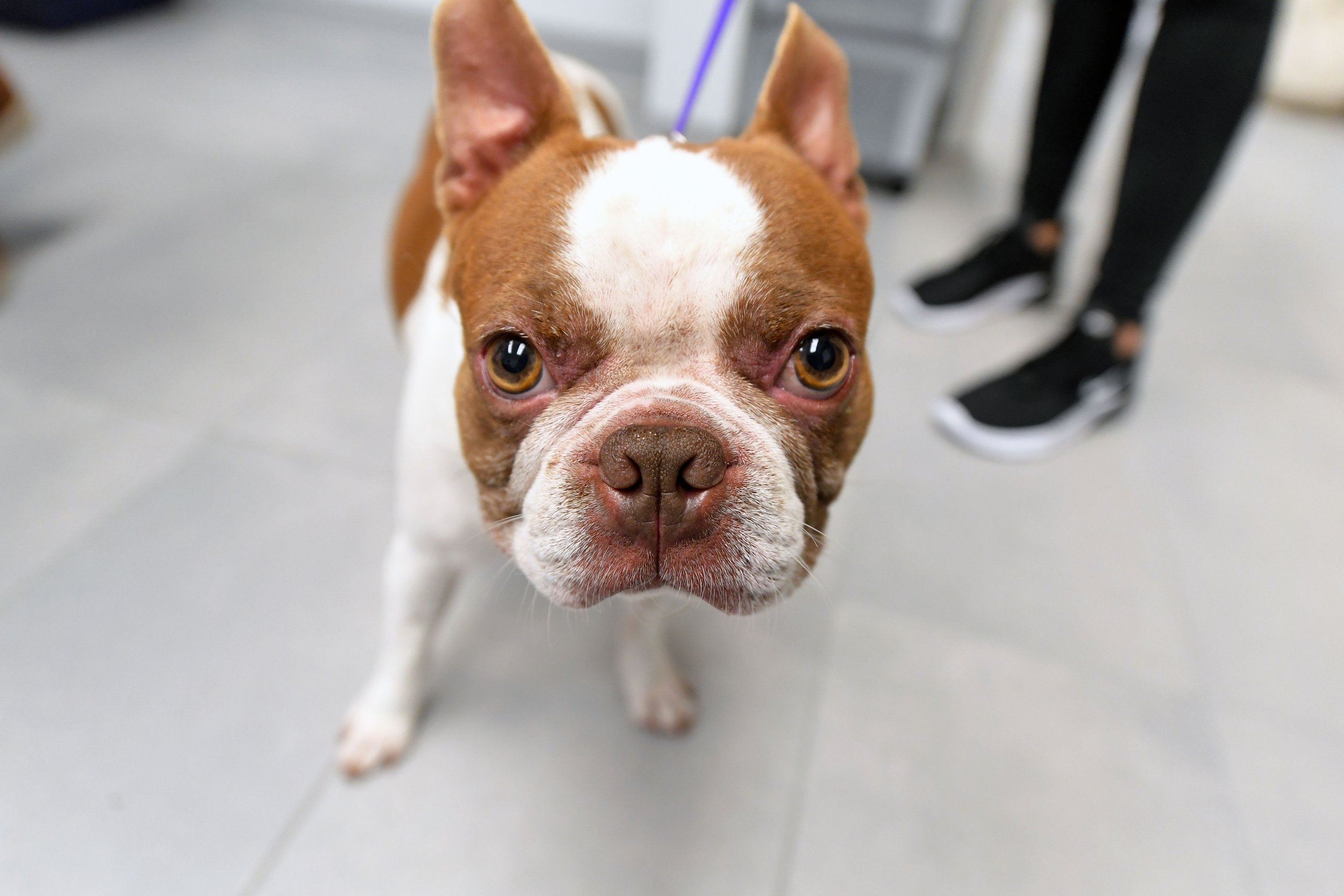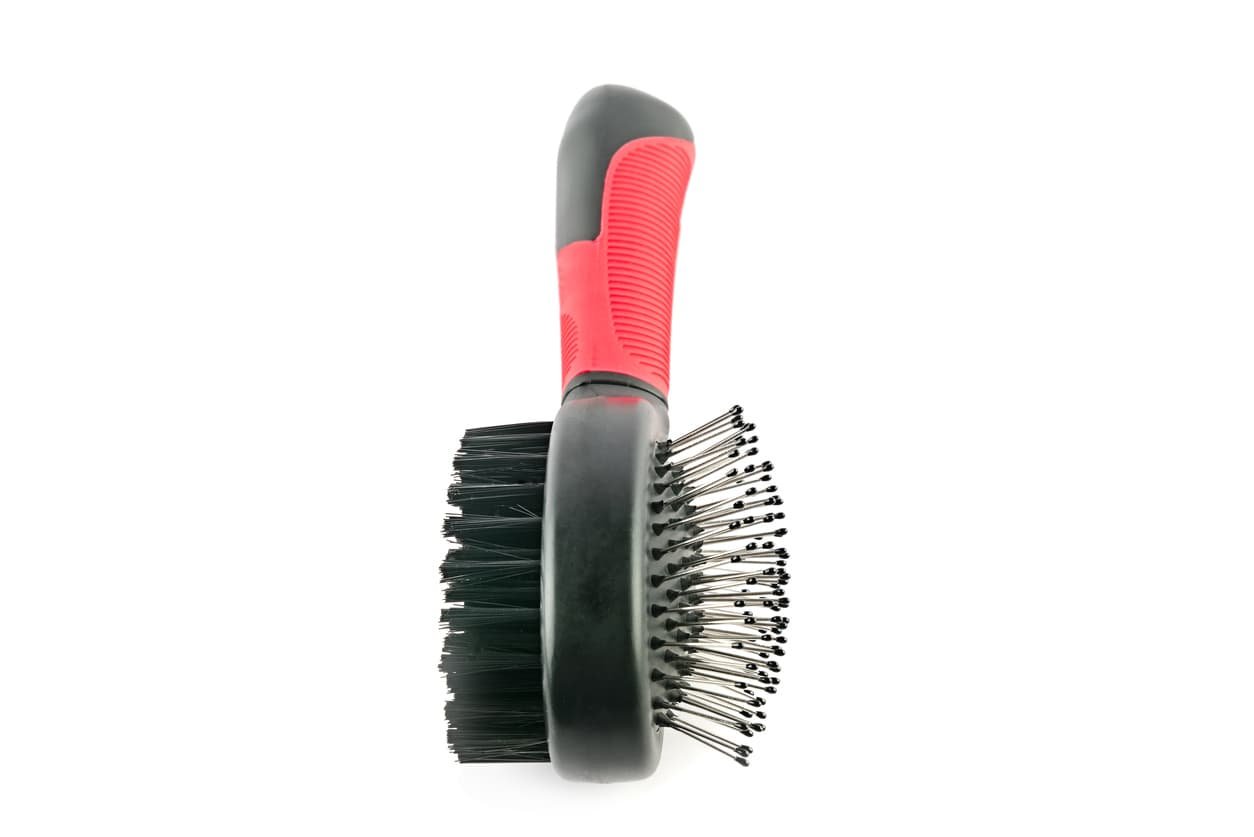Your Guide to Choosing the Best Brush for Short-Haired Dogs
Regular brushing is good for your short-haired dog. Here’s how to choose the right tools for the job (and why doing so is important).
Dogs need regular brushing to keep their coats and skin healthy.
Regular brushing removes dead skin and prevents issues.
Brushing your dog helps prevent fleas and ticks.
There are three basic kinds of dog brushes for short-haired dogs: slicker brushes, pin brushes, and combo brushes. Each type has unique features and is suitable for different coat lengths and shedding levels.
Are you the proud parent of a short-haired dog? These pups need regular brushing to keep their skin healthy and prevent fleas and ticks, just like their longer-haired counterparts.
Sometimes choosing a brush can be difficult, however. Dog brushes come in many shapes, sizes, and colors, which can make selecting one overwhelming for even the most dedicated pup parent! This guide will give you the inside scoop on why brushing is so important, what to look for in a brush, the three most common kinds of brushes, and how to choose the best brushes for short-haired dogs.
Why short-haired dogs need regular brushing to remove loose hair
Your short-haired dog has an advantage over other breeds. Brushing is much easier and the process can go much quicker, which means more time for fun, games, and cuddling.
Even short-haired dogs need regular brushing to keep their coats healthy, remove loose fur, dead skin, and dandruff, plus keep yeast infections away. Regular brushing is essential for maintaining the health of your dog's coat. Breeds like dobermans, dachshunds, min pins, pugs, and other short-haired pups benefit from a good brushing just as much as those with longer coats.
Here are a few more benefits:
It prevents matting
Yes, even short-haired dogs can get matted fur. Mats can lead to severe skin infections, parasites, and bacteria growth if left unattended, and it’s also just plain painful! Those tight clumps of matted fur are constantly pulling on your pup’s skin. Regular brushing keeps mats from forming and protects the dog's skin from infections and parasites.
It stimulates your dog’s fur
Brushing isn’t just about dead skin or matting. It also helps stimulate production of your dog’s natural oils and spreads these oils through their fur. The result is that your pup’s fur looks healthy and shiny.
It prevents fleas and ticks
Regular brushing helps remove fleas and ticks from your dog’s coat. Brushing alone will not fix a pest problem, but it will give you (or your dog care team member) the chance to spot fleas and deal with the problem before it gets worse. Brushing also helps remove loose hair and dead hair, reducing the amount of hair found around the house.
Brushing your dog can be a wonderful bonding experience. Different breeds have different brushing needs based on their coat length. If your short-haired dog’s coat is smooth, a good brushing once every few weeks may be enough. Those with short, dense fur may need to be brushed once per week. This will help prevent matting and other issues.
How to find the best dog brushes for short-haired dogs
You’ll need the right tools to make the brushing experience easy for you and comfortable for your pup. They come in a wide variety of shapes, sizes, and textures, so here are the characteristics to look for in a brush:
Soft bristles – Short-haired dogs have less space between their fur and skin. Any brush should thus have soft bristles to prevent aggravating or hurting the dog's skin. Bristle brushes are popular for short-haired breeds, and brushes with rounded edges are another popular choice. This will be much gentler on your dog’s skin. Nylon and rubber bristles are another gentle option for removing dead skin and fur while keeping your dog comfortable. A rubber brush is also effective for hair removal and provides a gentle grooming experience.
Comfortable handle – Choose a brush with a soft, easy-to-grip handle. This will keep your hand from aching during marathon grooming sessions for dogs with dense fur.
Easily cleaned – Even the best brush for short-haired dogs is going to get clogged with fur from time to time. Choose a brush that makes it easy to remove collected fur. Some models have retractable bristles, and others have more spacing between the bristles. Both designs make fur removal a breeze.
Find the ideal size – You’ll want a brush that’s easy to hold onto, but large enough to brush through a large amount of your dog’s fur. Using a tiny brush on a big dog means you’ve got quite a journey ahead of you! Be sure to choose the right size for your pup.
Only safe materials – Find a brush with dog-safe, durable materials. You want it to be robust and stand up to many bushings, after all. A waterproof one made of the proper materials can prevent bacteria build-up, which can help during bath time.
The 3 best brushes for short-haired dogs
While dog brushes have many varieties, the three biggies are slicker brushes, wire brushes, and de-shedding tools. Here’s what to know about them:
Slicker brushes
Slicker brushes are another name for pin brushes. While useful for detangling, the pins can be harmful to your dog’s skin. Nylon and rubber bristles are best in a slicker brush. Slicker brushes help remove loose hair and maintain the pet's coat by effectively grabbing and removing dead hair, reducing shedding, and stimulating the dog's skin.
Bristle brushes
De-shedding tools help remove loose fur, just as their name implies! Even short-haired dogs shed, so having one of these on hand can make your life easier. Used consistently, a de-shedding tool can even help reduce your dog’s overall shedding. Bristle brushes are effective in removing loose hairs and keeping the pet's coat healthy by distributing natural oils and collecting excess fur.
Other Options
Another option is a grooming glove. You put the glove on and just pet your dog! If your dog enjoys petting, this is a calming way to help detangle your pup’s fur while making for an enjoyable experience.
Let's get your dog's “brush on!” to distribute natural oils
Regular brushing offers so many health benefits for your short-haired pup. Regular brushing helps keep the pup's skin healthy by removing dead skin and dandruff. It is also important for dogs with short hair to maintain their health and appearance. You might feel a lot of pressure if you’ve got a busy schedule or hectic life, though. That’s where Scenthound can help.
Starting your dog on a routine basic hygiene package keeps your pup groomed, bathed, and looking great. Plus, having an extra set of eyes on your pup helps spot any fur problems, skin rashes, or other issues before they turn into larger issues.
Want to put your dog’s hygiene and routine care on autopilot? Join our monthly care club! Use our handy store locator to find the location closest to you!



